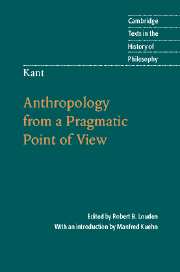Book contents
- Frontmatter
- Contents
- Introduction
- Chronology
- Further reading
- Note on the text and translation
- Anthropology from a Pragmatic Point of View
- Preface
- Contents
- Part I Anthropological Didactic. On the way of cognizing the interior as well as the exterior of the human being
- Book I On the cognitive faculty
- Book II The feeling of pleasure and displeasure
- Book III On the faculty of desire
- Part II Anthropological Characteristic. On the way of cognizing the interior of the human being from the exterior
- Index
- Cambridge Texts in the History of Philosophy
Book III - On the faculty of desire
Published online by Cambridge University Press: 05 June 2012
- Frontmatter
- Contents
- Introduction
- Chronology
- Further reading
- Note on the text and translation
- Anthropology from a Pragmatic Point of View
- Preface
- Contents
- Part I Anthropological Didactic. On the way of cognizing the interior as well as the exterior of the human being
- Book I On the cognitive faculty
- Book II The feeling of pleasure and displeasure
- Book III On the faculty of desire
- Part II Anthropological Characteristic. On the way of cognizing the interior of the human being from the exterior
- Index
- Cambridge Texts in the History of Philosophy
Summary
Desire (appetitio) is the self-determination of a subject's power through the representation of something in the future as an effect of this representation. Habitual sensible desire is called inclination. Desiring without exercising power to produce the object is wish. Wish can be directed toward objects that the subject himself feels incapable of producing, and then it is an empty (idle) wish. The empty wish to be able to annihilate the time between the desire and the acquisition of the desired object is longing. The undetermined desire, in respect of the object (appetitio vaga), which only impels the subject to leave his present state without knowing what state he then wants to enter, can be called the peevish wish (one that nothing satisfies).
Inclination that can be conquered only with difficulty or not at all by the subject's reason is passion. On the other hand, the feeling of a pleasure or displeasure in the subject's present state that does not let him rise to reflection (the representation by means of reason as to whether he should give himself up to it or refuse it) is affect.
To be subject to affects and passions is probably always an illness of the mind, because both affect and passion shut out the sovereignty of reason. Both are also equally vehement in degree; but as concerns their quality they are essentially different from each other, with regard both to the method of prevention and to that of the cure that the physician of souls would have to apply.
- Type
- Chapter
- Information
- Kant: Anthropology from a Pragmatic Point of View , pp. 149 - 182Publisher: Cambridge University PressPrint publication year: 2006



